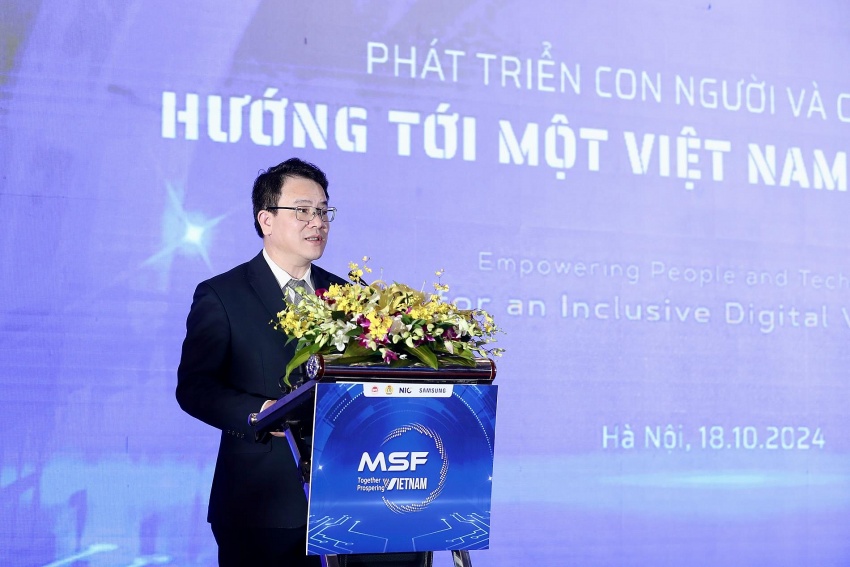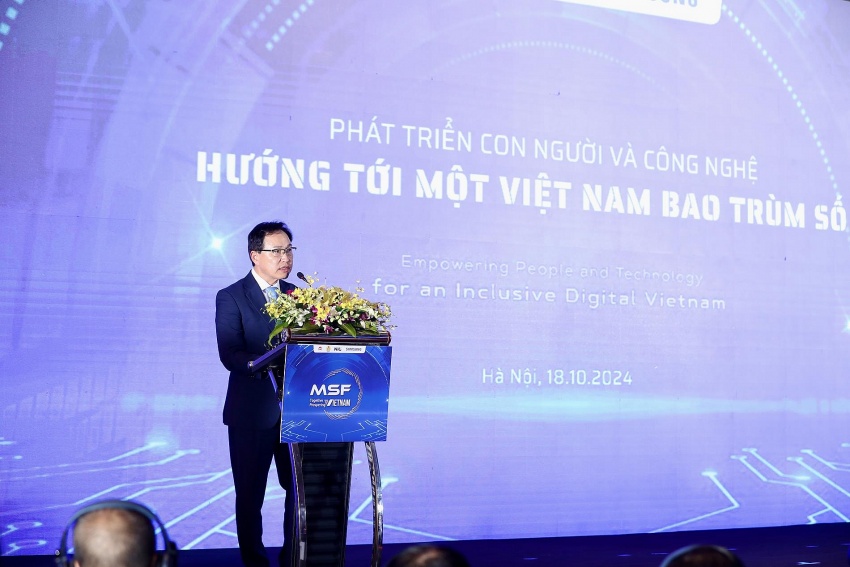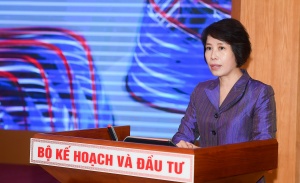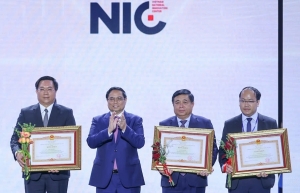Building an inclusive digital Vietnam
The Multi-Stakeholders Forum (MSF) 2024, held on October 18 in Hanoi under the theme "Empowering People and Technology: Towards an Inclusive Digital Vietnam," addressed these challenges with a focus on not leaving anyone behind in the country’s digital transformation journey.
 |
| Deputy Minister of Planning and Investment Tran Quoc Phuong. Photo: MPI |
Deputy Minister of Planning and Investment Tran Quoc Phuong highlighted that the Ministry of Planning and Investment (MPI) has been actively advising and submitting policies, programmes, and projects to promote digital transformation, aiming for sustainable and equitable development.
The MPI has also tasked the National Innovation Centre with coordinating relevant agencies to implement programmes to improve digital skills for the workforce and those who face difficulties accessing technology. This includes digital skills training under the "New Opportunity" programme and basic AI education for the public.
In recent years, many organisations and individuals have taken action to build an inclusive digital future, ensuring that technology serves all and helps individuals unlock their potential and realise their ambitions.
According to a report by Google, the annual economic impact of digital technology in Vietnam could reach $74 billion by 2030. However, Deputy Minister Phuong noted that achieving the goal of the National Strategy for Digital Economy and Digital Society Development–aiming to equip over 70 per cent of the working population with basic digital skills by 2030–remains a significant challenge, particularly for vulnerable groups.
"Narrowing the digital gap is a pressing issue, especially as the rapid development of digital technology leaves vulnerable groups at risk of falling behind," said Phuong. "A large part of society, including the elderly, people with disabilities, children in remote areas, and those in difficult circumstances, still struggle to access digital technology."
Phuong emphasised that improving digital capacity was a long-term process requiring joint efforts across society. "By creating a supportive learning environment and providing necessary tools, people with disabilities, workers, and those in remote areas can integrate into the digital society and enjoy the benefits that digital technology offers," he added.
 |
| Choi Joo Ho, CEO of Samsung Vietnam |
Patrick Haverman, deputy resident representative of the United Nations Development Programme (UNDP) in Vietnam, cited an example from a TikTok livestream session in Vietnam that generated VND75 billion ($3 million) in revenue, illustrating how Vietnamese people are leveraging technology to boost the economy.
"Vietnam is a dynamic internet market, covering 80 per cent of the population," Haverman said.
However, he also expressed concerns about inclusivity, warning that while some people benefit from new platforms, others risk being left behind.
Assoc. Prof. Dr. Le Hoang Son from Hanoi National University pointed out that the challenges in building an inclusive digital ecosystem in Vietnam stem from two main factors: the gap in access to technology and barriers faced by disadvantaged groups. He noted that the digital infrastructure gap between urban and rural areas, along with economic disparities, makes it difficult for low-income individuals to access smart devices and computers.
"Barriers such as skills, language, and infrastructure further limit access for vulnerable groups, including the elderly, ethnic minorities, and people with disabilities, increasing the risk of exclusion from the digital transformation process," Son said
Haverman suggested three solutions for addressing these challenges: promoting the large-scale availability of assistive technology, strengthening cybersecurity measures to build trust in digital systems, and continuously assessing the impact of digital transformation on both economic growth and vulnerable populations.
Deputy Minister Phuong also called for the development of tailored digital skills training programmes for vulnerable groups, helping them gain confidence and participate in the labour market.
"We need to encourage technology companies and startups to create products that cater to people with disabilities and vulnerable groups, such as communication apps, online learning platforms, and mobility support tools," Phuong said.
At the MSF, the "InclusiveTech for Social Innovation" Award was presented for the first time, honouring 15 outstanding initiatives that have used technology to bridge the digital divide and increase access to technology for disadvantaged and vulnerable groups. These projects have paved the way for broader access to technology, laying the foundation for sustainable and inclusive development.
The MSF is an annual event initiated by Samsung Vietnam to foster collaborative action in addressing Vietnam’s development challenges.
 | Innovate Vietnam 2024 set to welcome 20,000 attendees The establishment of the NIC (National Innovation Centre) reflects the Vietnamese government's determination to enable innovation, while Innovate Vietnam 24 looks to discuss advances in the field in early October. |
| US shows support for Vietnam's semiconductor industry The United States and Vietnam marked the first anniversary of its Comprehensive Strategic Partnership by launching workshops on semiconductor workforce development and public policy workshops. |
| Vietnam to launch investment incentives for semiconductor industry Vietnam is set to introduce a robust incentive framework to selectively attract foreign investment into high-tech industries, particularly in the semiconductor and electronics sectors, to be backed by central and local government budgets. |
 | Vietnam to become a country of origin of innovation Prime Minister Pham Minh Chinh highly appreciated the initial success of the National Innovation Centre at its fifth anniversary celebrations and the official opening of Innovate Vietnam 2024 on October 1 at Hoa Lac Hi-Tech Park in Hanoi. |
What the stars mean:
★ Poor ★ ★ Promising ★★★ Good ★★★★ Very good ★★★★★ Exceptional
 Tag:
Tag:
Related Contents
Latest News
More News
- Vietnam, New Zealand seek level-up in ties (February 19, 2026 | 18:06)
- Untapped potential in relations with Indonesia (February 19, 2026 | 17:56)
- German strengths match Vietnamese aspirations (February 19, 2026 | 17:40)
- Kim Long Motor and AOJ Suzhou enter strategic partnership (February 16, 2026 | 13:27)
- Haiphong welcomes long-term Euro investment (February 16, 2026 | 11:31)
- VIFC in Ho Chi Minh City officially launches (February 12, 2026 | 09:00)
- Norfund invests $4 million in Vietnam plastics recycling (February 11, 2026 | 11:51)
- Marico buys 75 per cent of Vietnam skincare startup Skinetiq (February 10, 2026 | 14:44)
- SCIC general director meets with Oman Investment Authority (February 10, 2026 | 14:14)
- G42 and Vietnamese consortium to build national AI infrastructure (February 09, 2026 | 17:32)


























 Mobile Version
Mobile Version